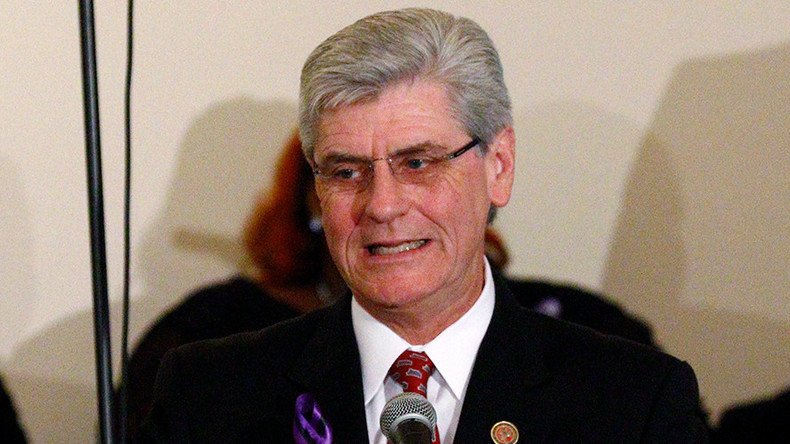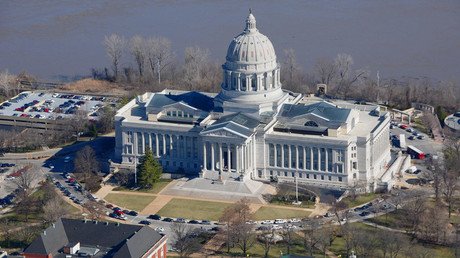Mississippi’s controversial ‘religious freedom’ bill signed into law

Mississippi’s “religious freedom” bill has been signed into law by Governor Phil Bryant. The legislation creates a right to withhold services aiding same-sex marriage and extramarital sex, as well as from transgender people, based on religious objection.
Bryant signed House Bill 1523 into law on Tuesday, saying in a statement that the measure aims to "protect sincerely held religious beliefs and moral convictions of individuals, organizations and private associations from discriminatory action by state government or its political subdivisions" such as local governments and state universities. Bryant asserted that the law will not "limit any constitutionally protected rights or actions of any citizen of this state under federal or state laws."
I have signed House Bill 1523. Full statement: pic.twitter.com/00DbgQADFt
— Phil Bryant (@PhilBryantMS) April 5, 2016
Supporters of Mississippi's law, and similar laws passed or debated in other states, say the measures are necessary to protect religious beliefs that stand in opposition to the federal government's recognition of same-sex marriages. Gov. Bryant said the law "merely reinforces" existing religious freedoms.
“It gives protection to those in the state who cannot in a good conscience provide services for a same-sex marriage,” State Senator Jennifer Branning said on the floor of the Senate last week.
Thankful for Governor @PhilBryantMS and the Mississippi legislators who voted to protect religious freedom. #HB1523https://t.co/ts8Afefs22
— Franklin Graham (@Franklin_Graham) April 5, 2016
Mississippi is now the safest state in the Union to be a man or woman of faith.
— Bryan Fischer (@BryanJFischer) April 5, 2016
Opponents of the law say the measure allows government-sanctioned discrimination. They point out that even without the law, Mississippi, like many other states, allows for open discrimination on the basis of sexual orientation or gender identity in areas such as employment and housing. Yet the Mississippi law does add explicit protection for those who choose to discriminate based on their faith.
SPLC’s Jody Owens on the signing of the anti-LGBT #HB1523 by Mississippi Gov. Phil Bryant https://t.co/OEPw04w33rpic.twitter.com/fE3WiI4zhT
— SPLC (@splcenter) April 5, 2016
The law allows for denial of services, goods, employment, wedding products, and housing to LGBT people. The measure also protects those who refuse to provide medical treatment, counseling, or surgeries involving sex reassignment or gender identity.
The law shields those who hold that "sexual relations are properly reserved” to married couples of the opposite sex.
House Bill 1523 defines gender as “objectively determined by anatomy and genetics at time of birth.”
BREAKING: Nissan condemns #HB1523. @MSTODAYnews@HRC@ACLU_MS#msleg
— Zachary Oren Smith (@ZacharyOS) March 31, 2016
4 More: @GanucheauAdamhttps://t.co/SDlHvDkfArpic.twitter.com/pzOa0PkzQC
The law also defines a "person" to include a “sole proprietorship, or closely held company, partnership, association, organization, firm, corporation, cooperative, trust, society or other closely held entity.”
Individuals acting on the basis of their faith cannot be retaliated against by the state by way of fines, withholding loans, refusal to hire, or other potential acts.
We believe #equality & nondiscrimination fosters talent & innovation. We join with other businesses in calling for the repeal of #HB1523.
— Levi Strauss & Co. (@LeviStraussCo) April 5, 2016
For example, state employees who refuse to issue marriage licenses or religious organizations that discipline employees are protected by the law. Though in the case of marriage licenses, the bill’s sponsor says the measure has been misrepresented.
"It specifically says that is a case where a person has a religious conviction, they can decline, but they must provide somebody in their office to provide that service," said Republican Rep. Andy Gipson, according to Mississippi Public Broadcasting.
Mississippi right now #HB1523pic.twitter.com/9tfXsLOvuj
— Will Kremer (@WillKremer) April 5, 2016
Opponents say the law will likely involve significant legal fees as a result of court challenges.
“It’s void at the start, and it’s done strictly for pandering,” said Democratic Rep. Jay Hughes. “It’s going to cost us, at a time when our budget is so week, it’s going to cost us tens-of-thousands, hundreds-of-thousands, probably going to private attorneys instead of the attorney general to defend a law that was illegal from the time it was introduced.”
Similar laws have made their way through legislatures of conservative states this spring. Last month, North Carolina passed a law that bars local governments from enacting anti-discrimination ordinances and bans transgender people from restrooms consistent with their adopted gender identity. Top corporations like Apple and Bank of America have voiced disapproval of the law. PayPal has gone so far as to cancel plans to expand its operations in the state because of its opposition.
PayPal Withdraws Plan for Charlotte Expansion: https://t.co/s345K2iLhR
— PayPal (@PayPal) April 5, 2016
Georgia Governor Nathan Deal recently rejected a similar measure in his state after much backlash from major organizations, such as the National Football League.
In Missouri, the legislature has approved a "religious freedom" amendment to the state constitution, which will appear on the ballot in November. The likes of Mastercard, Monsanto, and the National Collegiate Athletic Association have all voiced their opposition to the proposal.
Missouri's proposal is similar to Indiana's religious freedom restoration act, a religious exemption law that prompted boycotts and business protests in the state last year, costing Indiana as much as $60 million in economic benefits, according to a tourism group survey.














